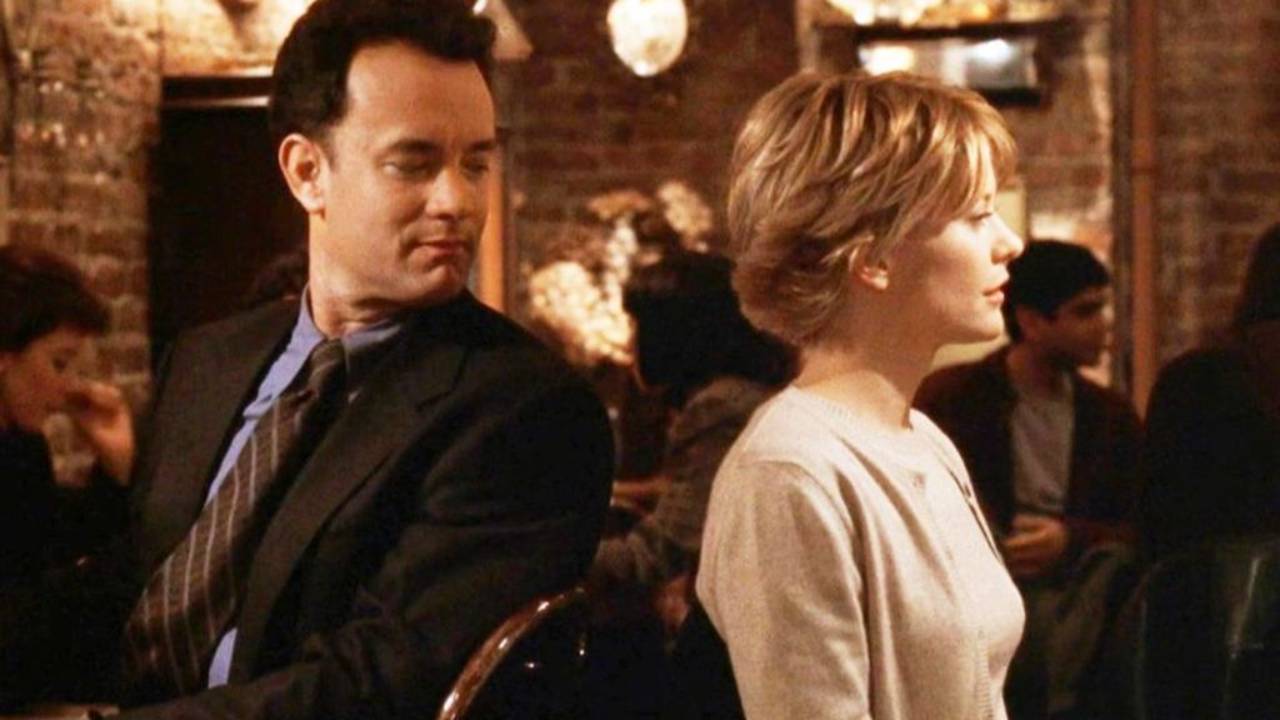The Hidden Darkside of You've Got Mail
Aug 11, 2025
Professional writers are terrible people to watch a movie with – or so I am told by my various, non-writing friends. Once trained in the intricacies of storytelling, writers find it nigh on impossible to lose themselves in the fictional work of another author without instinctively looking to scheme out the plot points and determine – annoyingly ahead of time for their watch-along companions – what will happen next in the story. Along with this ‘bad habit’, we writers also tend to possess the added vice of the intuitive rewrite. Part and parcel of the professional experience for writers is learning how to tear asunder their own work – like stripping down the components that make up a car – and rebuilding it based on the specifications provided by their script editor or executive producer.
In relation to myself, this involuntary trait manifests most powerfully when I am revisiting a personal favourite. Last week, I watched You’ve Got Mail for the first time in over a decade. Now, I absolutely love Tom Hanks and Meg Ryan – both individually and as a romcom power couple. Nora Ephron was a wonderful writer and director. The movie itself is a remake. It is based on an original play by Miklos Laszlo entitled Parfumerie, that was first made into a movie in 1940, entitled The Shop Around the Corner, starring Jimmy Stewart and Margaret Sullavan.
The story (in all three iterations) appears to be sweet, funny and entirely inoffensive. A couple who meet in real life and hate one another fall in love through their anonymous correspondence, pen pals exchanging letters in the earlier versions, and trendy Manhattanites swapping emails in the 1998 incarnation. Before my recent rewatch, I never had a problem with how the story played out. And, in full disclosure, I have never seen the original movie or play for comparison. But something occurred to me last week – as my intuitive rewrite tick kicked in with a vengeance. Unsure as to how and why I had never noticed it before – I suddenly realised that You’ve Got Mail is not some sweet and uplifting love story. It is, in fact, a very dark and disturbing tale about the relentless march of late-stage capitalism and its despotic hunger for the non-conforming individual to bow down before said altar.
Check out the broad beats:
Tom is a multi-millionaire. CEO and heir to a soulless, global powerhouse that sells cheap-ass books and is hellbent on putting Mom and Pop operations out of business.
Meg curates a beloved, local bookstore, founded by her dear, departed mother, that has nurtured a love of reading in multiple generations of children.
They meet in person.
Tom immediately lies and deceives Meg.
He conducts corporate espionage and sizes up her business for obliteration.
He then deliberately builds a megastore nearby – to put her out of business.
They meet socially and dislike one another. Yadda, yadda, yadda.
Tom discovers Meg is his online love and keeps this a secret from her, using the inside information to manipulate and win over her affections in person.
When he finally reveals the truth, surprise, surprise, he once again willfully manipulates her emotions in order to break down her defences and gain her declaration of love for him.
The end.
All of this, underscored by a jaunty and pleasant musical score by George Fenton.
Question number one…
HOW COME I DIDN’T NOTICE ANY OF THIS BEFORE???!
Christ on a bike, the propaganda practised by Big Brother in 1984 is far less aggressive and cynical.
Question number two…
If I were to take a punt at rewriting this monstrous tale, masquerading as a middle of the road romantic comedy, how would I reconfigure the journey and outcome?
Simple, really.
Tom would retain the power to wipe out Meg’s beloved bookstore.
But before he could pull the trigger, he would realise his online email love and Meg are one and the same.
This would create an existential conflict for Tom.
One the one hand, he is a third generation, rich and ruthless asshole. But a also a lonely and seemingly decent guy in his late 30s, who has finally found the woman of his dreams and does not want to lose her.
Tom chooses love.
The price he pays is ostracisation.
He is cut off from the family fortune.
He is fired and sent into exile.
Tom disappears from Meg’s life.
In person and online.
At the same time, Meg and her bookstore are gifted a surprising reprieve from bankruptcy.
Unbeknownst to Meg, before being ousted from the family business, Tom sabotaged their plans to build the soulless megastore nearby. This heroic and sacrificial act guarantees the survival of Meg’s bookstore for generations to come.
Meg begins to wonder.
To follow her funny feeling.
Somehow she knows that the saving of her business and the disappearance of Tom are connected.
Meg tracks him down.
Maybe Tom is now working as a gardener (the vocation he always adored and wanted to pursue, before his family forced him to join the family business and destroy lives for fun and profit).
Meg confronts Tom.
Gives him the chance to fess up.
Tom demurs.
He won’t take advantage of her sympathy.
He loves her too much for that.
He will remain anonymous.
Meg forces the truth out by quoting an email exchange.
Tricking Tom into revealing himself as her online soul mate.
Meg kisses Tom.
We recycle the famous Don’t cry, Shopgirl line.
Just have Meg say it to Tom instead.
They fall in love.
She keeps the bookstore.
Tom tends garden.
And they live happily ever after.
As stated at the beginning of this blog, writers are the worst to watch movies with!!
Are you serious about changing your story?
We can help!
Book one-on-one sessions, group workshops or browse our ebooks here:
Don't be a Stranger!
Keep up to date with Trevor's Tales from the Whiteboard, be the first to hear about special offers, and build your Story Power!
Don't worry, your information will not be shared.
We hate SPAM. We will never sell your information, for any reason.

